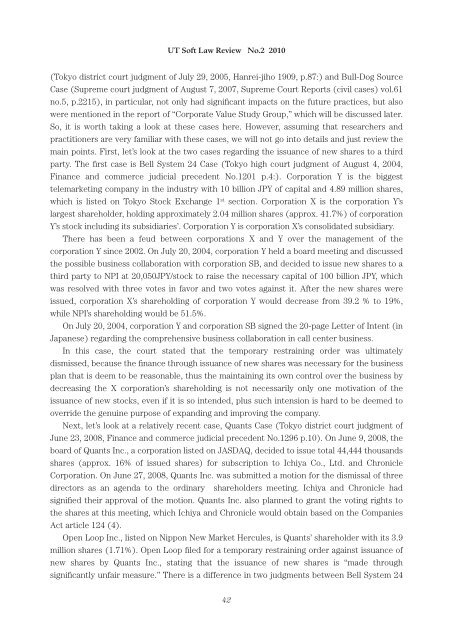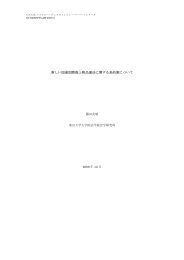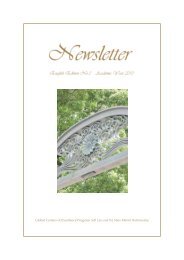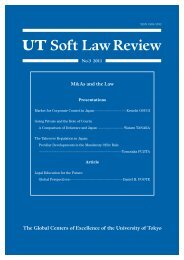UT Soft Law Review
UT Soft Law Review
UT Soft Law Review
Create successful ePaper yourself
Turn your PDF publications into a flip-book with our unique Google optimized e-Paper software.
<strong>UT</strong> <strong>Soft</strong> <strong>Law</strong> <strong>Review</strong> No.2 2010(Tokyo district court judgment of July 29, 2005, Hanrei-jiho 1909, p.87:) and Bull-Dog SourceCase (Supreme court judgment of August 7, 2007, Supreme Court Reports (civil cases) vol.61no.5, p.2215), in particular, not only had significant impacts on the future practices, but alsowere mentioned in the report of “Corporate Value Study Group,” which will be discussed later.So, it is worth taking a look at these cases here. However, assuming that researchers andpractitioners are very familiar with these cases, we will not go into details and just review themain points. First, let’s look at the two cases regarding the issuance of new shares to a thirdparty. The first case is Bell System 24 Case (Tokyo high court judgment of August 4, 2004,Finance and commerce judicial precedent No.1201 p.4:). Corporation Y is the biggesttelemarketing company in the industry with 10 billion JPY of capital and 4.89 million shares,which is listed on Tokyo Stock Exchange 1 st section. Corporation X is the corporation Y’slargest shareholder, holding approximately 2.04 million shares (approx. 41.7%) of corporationY’s stock including its subsidiaries’. Corporation Y is corporation X’s consolidated subsidiary.There has been a feud between corporations X and Y over the management of thecorporation Y since 2002. On July 20, 2004, corporation Y held a board meeting and discussedthe possible business collaboration with corporation SB, and decided to issue new shares to athird party to NPI at 20,050JPY/stock to raise the necessary capital of 100 billion JPY, whichwas resolved with three votes in favor and two votes against it. After the new shares wereissued, corporation X’s shareholding of corporation Y would decrease from 39.2 % to 19%,while NPI’s shareholding would be 51.5%.On July 20, 2004, corporation Y and corporation SB signed the 20-page Letter of Intent (inJapanese) regarding the comprehensive business collaboration in call center business.In this case, the court stated that the temporary restraining order was ultimatelydismissed, because the finance through issuance of new shares was necessary for the businessplan that is deem to be reasonable, thus the maintaining its own control over the business bydecreasing the X corporation’s shareholding is not necessarily only one motivation of theissuance of new stocks, even if it is so intended, plus such intension is hard to be deemed tooverride the genuine purpose of expanding and improving the company.Next, let’s look at a relatively recent case, Quants Case (Tokyo district court judgment ofJune 23, 2008, Finance and commerce judicial precedent No.1296 p.10). On June 9, 2008, theboard of Quants Inc., a corporation listed on JASDAQ, decided to issue total 44,444 thousandsshares (approx. 16% of issued shares) for subscription to Ichiya Co., Ltd. and ChronicleCorporation. On June 27, 2008, Quants Inc. was submitted a motion for the dismissal of threedirectors as an agenda to the ordinary shareholders meeting. Ichiya and Chronicle hadsignified their approval of the motion. Quants Inc. also planned to grant the voting rights tothe shares at this meeting, which Ichiya and Chronicle would obtain based on the CompaniesAct article 124 (4).Open Loop Inc., listed on Nippon New Market Hercules, is Quants’ shareholder with its 3.9million shares (1.71%). Open Loop filed for a temporary restraining order against issuance ofnew shares by Quants Inc., stating that the issuance of new shares is “made throughsignificantly unfair measure.” There is a difference in two judgments between Bell System 2442





